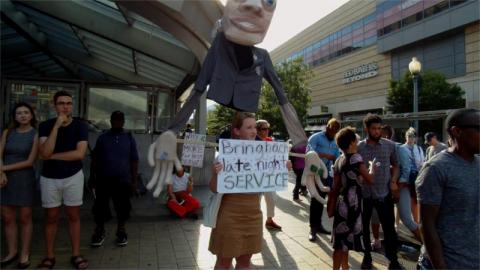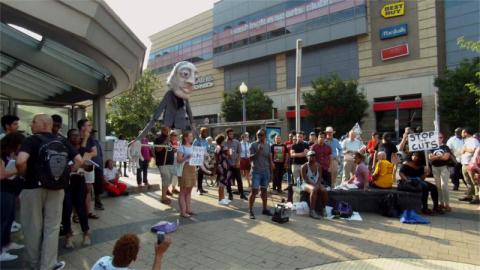"Save our System" rally demands no more Metro fare hikes or service cuts
On the 29th of June, Metro bus and rail riders gathered outside the Columbia Heights Metro station to demand an end to fare hikes and service cuts, and that big developers and businesses that depend on Metrorail to make their billions pay their fare share of the cost of keeping the system running. A specific demand was a flat $2 fare for both bus and rail, and the restoration of late-night service.
Metro's riders were backed by ATU Local 689, which represented Metro's workers, the folks without which Metro does not run at all. Without them, and the people who ride on Metro bus and rail, the flow of money to major shopping areas, lobbyists, and even the big corporate law firms just stops. Combined Metro's riders and unionized workforce wield a great deal of power.
If Metro's workers were to respond to reductions in subsidies from local government by refusing to provide service to major shopping areas, that would force the jurisidictions to the table. It would be a simple matter of not opening train doors and not stopping busses at the offending shopping zones. Along the same lines,the Pentagon could be denied service if the Federal government won't pay their "fare share," so to speak.
Instead of making developers, shopping centers, K st, et all pay for the money they make because of Metro, existing proposals are for things like sales taxes or even residential property taxes, almost as though the proposals for a consistant Metro funding source were intended to be so unpopular they would never pass. A gas tax would be another option and still leave gas cheap compared to 2008, but politicians consider raising gas taxes the kiss of death.
This year WMATA has increased Metrobus fares to $2 from $1.75, plus an additional $2 on some "express" routes. Another $0.10 has been added to the baseline Metrorail fare during already high-priced peak hours, and another $0.25 to the off-peak base fare. Meanwhile 33 bus routes are getting reduced service or being eliminated entirely, rail service is getting 25% fewer trains in rush hour, and no late-night service for at least two years.
Metro does in fact have the assets to offer 24-7 service between the rail stations, BTW. Between 11Pm and 6AM there is very little traffic on most roads. If during those hours busses ran over each Metrorail route, they could make nearly as good time, and better time than rail delayed by single-tracking around work. A few routes would have to be modified to deal with road realities, like transferring the Ft Totten and Catholic University stations from Red to Green Line service during these bus service hours due to east-west traffic conditions. It would still be possible to get from any Metrorail station to any other in reasonable time 24-7, and it would solve the problem about when to do track work on a two-track railroad.






